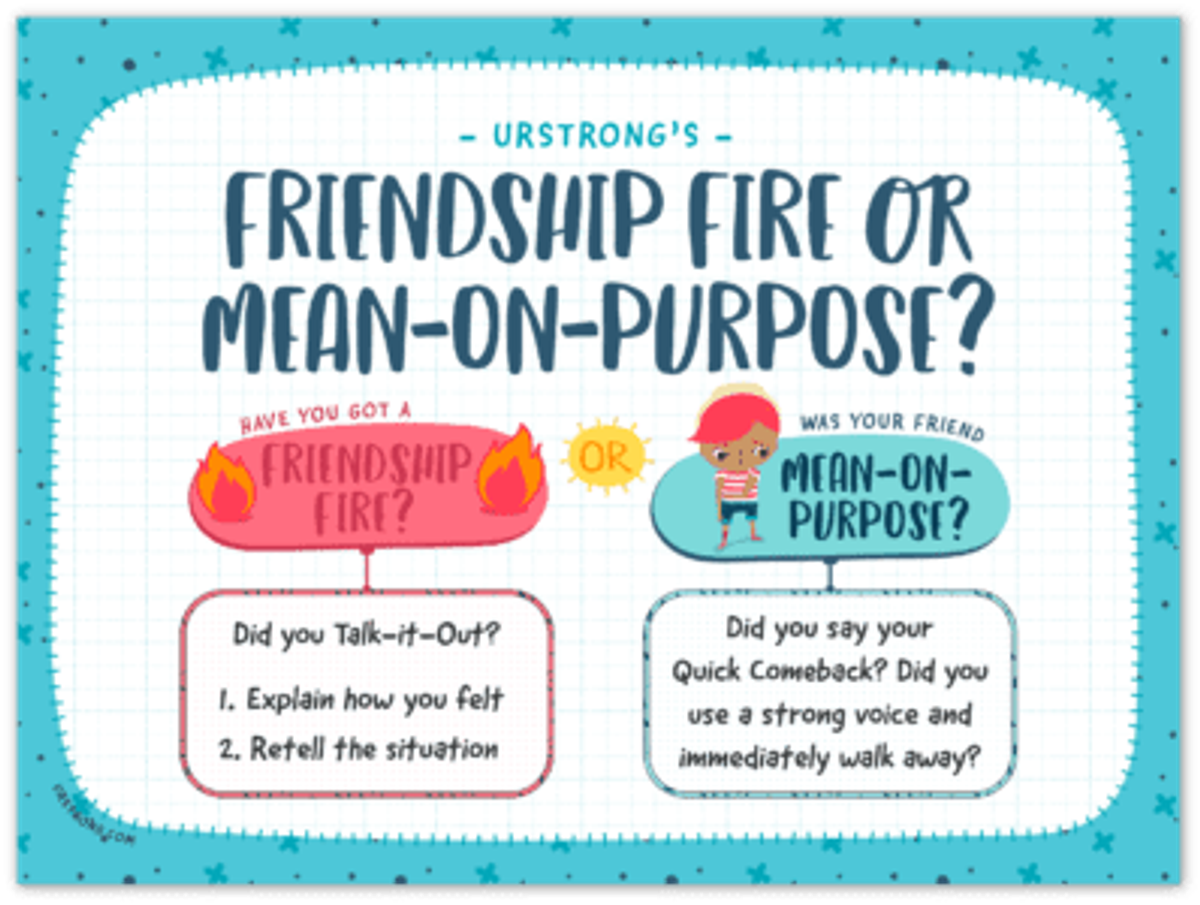Friendship Fire or Mean-on-Purpose?
Conflict is tricky! How can we tell the difference between Friendship Fires, Mean-on-Purpose, Mean-by-Accident, and Bullying?

Friendship Fire or Mean-on-Purpose?
Conflict is tricky! How can we tell the difference between Friendship Fires, Mean-on-Purpose, Mean-by-Accident, and Bullying?
We classify conflict into just two categories to keep things as easy as possible for kids: Friendship Fires® (normal conflicts between friends) and Mean-on-Purpose behavior. By making this distinction and establishing a common language, we can better coach and guide our children towards healthy friendships.
Kids and their parents sometimes mistakenly believe that any conflict with a friend is “bullying” (a word that is typically misused and misunderstood). Instead, however, we want to use simple, kid-friendly language. Here are a few common questions:
So, how can we tell the difference between a Friendship Fire or Mean-on-Purpose?
The difference really lies in intent—was it a misunderstanding or were they really trying to hurt your feelings? From the data we’ve collected so far, the majority of conflict that exists in schools are Friendship Fires (approx. 90%).
Can a friend be Mean-on-Purpose too?
Yes, absolutely, and it really hurts!
Can a friend be Mean-by-Accident?
Yep, this is a Friendship Fire.
Can a Friendship Fire escalate into Mean-on-Purpose?
Definitely. This is why we teach kids that timing is important when we put out our Friendship Fires. Sometimes we’re not ready or our friend isn’t ready to put out the Fire. If we continue to try and Talk-it-Out when the time isn’t right, we will inevitably make the Fire bigger.
Can we de-escalate a Mean-on-Purpose moment into a Friendship Fire?
For sure. Sometimes we misinterpret someone’s behavior as Mean-on-Purpose. When we respond with a Quick Comeback, the person knows we felt it was mean. This then allows that person to respond in a way that explains that their intent wasn’t to be mean. By doing this, they move into the Talk-it-Out phase on the Friend-o-Cycle and, thus, it’s downgraded to a Friendship Fire.
Your friend starts calling you the nickname, “Sweatpants,” because you always wear comfy pants to school. At first, you think it’s fun and it makes you feel closer to your friend. You both laugh about it and think it’s cool.
After time, it feels less funny and more like your friend is making fun of you. You start to feel offended and it’s really bugging you. THIS IS A FRIENDSHIP FIRE®.
In URSTRONG, we teach kids to (1) Retell the situation, and (2) Explain how it made you feel. This is a conversation.
You ask to talk to your friend and let them know that the nickname is actually making you feel bad. Through the conversation, you explain how you feel and you respectfully ask your friend to not call you “Sweatpants” anymore.
The next day, your friend continues calling you the nickname, fully knowing you don’t like it. THIS IS MEAN-ON-PURPOSE.
In URSTRONG, we teach kids to say their Quick Comeback in a strong voice and then walk away. This is not a conversation.
When your friend calls you the nickname again, knowing it’s hurtful, you say your Quick Comeback: “Stop.” You walk away and try to keep your focus on something that makes you happy.
At this point, we would let kids know that if this is a healthy friendship, your friend would respect you enough to stop calling you the nickname. If your friend continues calling you the name, trust and respect (Friendship Fact #3) break down, and this friendship would be in the unhealthy (red) zone of the Friend-o-Meter.
The URSTRONG advice: Spend less time with this friend. You deserve healthy, feel-good friendships and remember Friendship Fact #4: Friendships change…and that’s okay.
If your friend continued to be Mean-on-Purpose, despite standing up for yourself and communicating it’s not okay (through your Quick Comeback), then THIS IS BULLYING. (We describe bullying as ongoing, Mean-on-Purpose behavior.)


Written by Dana Kerford
Friendship Expert and Founder, URSTRONG